报考CFA之前,你会遇到的29个问题
cfa一级考点大全
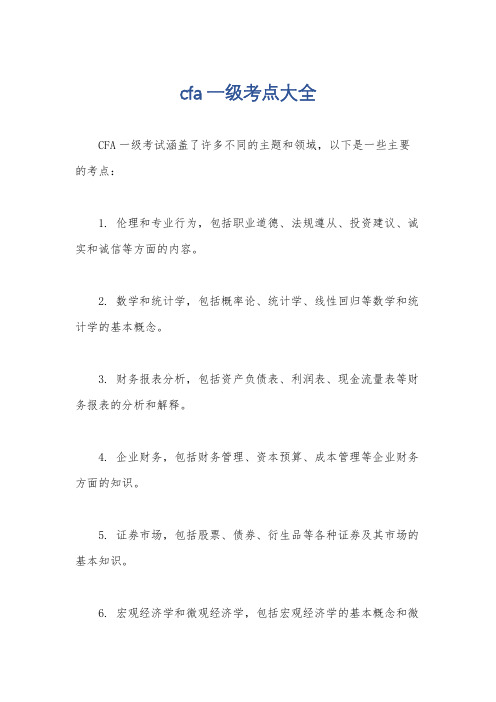
cfa一级考点大全
CFA一级考试涵盖了许多不同的主题和领域,以下是一些主要的考点:
1. 伦理和专业行为,包括职业道德、法规遵从、投资建议、诚实和诚信等方面的内容。
2. 数学和统计学,包括概率论、统计学、线性回归等数学和统计学的基本概念。
3. 财务报表分析,包括资产负债表、利润表、现金流量表等财务报表的分析和解释。
4. 企业财务,包括财务管理、资本预算、成本管理等企业财务方面的知识。
5. 证券市场,包括股票、债券、衍生品等各种证券及其市场的基本知识。
6. 宏观经济学和微观经济学,包括宏观经济学的基本概念和微
观经济学的供求关系、市场结构等内容。
7. 配置投资组合,包括资产配置、投资组合管理、风险管理等方面的知识。
8. 估值和资产定价,包括股票估值、债券估值、期权定价等方面的知识。
以上列举的仅仅是CFA一级考试的一部分考点,考生还需要深入学习和掌握更多的内容,才能顺利通过考试。
希望这些信息能对你有所帮助。
cfa公司金融知识点总结

cfa公司金融知识点总结一、投资1. 定义和特征投资是指将资金投入特定的资产或项目,以期望获得一定的回报或增值。
投资的特征包括风险、流动性、收益和成本等方面。
2. 投资工具投资工具包括股票、债券、期货、期权、外汇等。
不同的投资工具具有不同的特点和风险。
3. 投资组合投资组合是指将不同的投资工具进行组合,以达到一定的风险和收益平衡。
投资组合理论包括资本市场线、有效前沿、马科维茨模型等。
4. 投资市场投资市场包括股票市场、债券市场、外汇市场、商品市场等。
投资者需要了解不同市场的特点和规则。
5. 投资分析投资分析包括基本面分析、技术分析、事件驱动分析等。
投资者需要选择合适的分析方法来进行决策。
6. 投资策略投资策略包括价值投资、成长投资、指数投资、对冲基金等。
投资者需要根据自身的风险承受能力和投资目标来选择合适的策略。
二、公司金融1. 公司理财公司理财包括资本预算、资金管理、财务规划等。
公司需要合理规划和管理自身的资金流动,以维持业务运营和发展。
2. 资本结构资本结构是指公司通过债务和股权来融资的结构。
公司需要根据自身的经营需求和风险承受能力来选择合适的资本结构。
3. 资本预算资本预算是指公司对于长期投资项目进行决策和规划。
公司需要考虑投资项目的收益率、风险、资金成本等因素来进行预算。
4. 财务报表分析财务报表分析包括利润表、资产负债表、现金流量表等。
投资者需要根据财务报表来评估公司的财务状况和经营业绩。
5. 股权融资股权融资是指公司通过发行股票来筹集资金。
公司需要了解股权融资的特点和规则,并进行合理的选择和规划。
6. 债务融资债务融资是指公司通过发行债券来筹集资金。
公司需要了解债务融资的特点和风险,并进行合理的选择和管理。
三、金融市场1. 金融市场类型金融市场包括资本市场、货币市场、期货市场、外汇市场等。
不同的金融市场具有不同的特点和功能。
2. 金融市场参与者金融市场参与者包括投资者、金融机构、证券公司、交易所等。
CFA考试一级章节练习题精选0329-16(附详解)
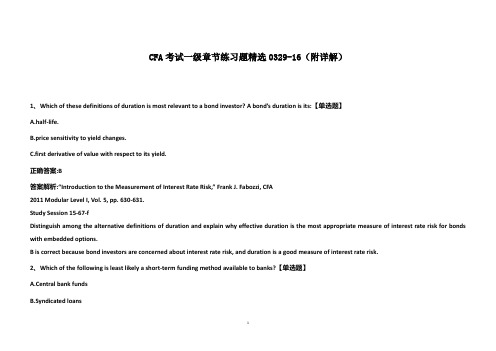
CFA考试一级章节练习题精选0329-16(附详解)1、Which of these definitions of duration is most relevant to a bond investor? A bond’s duration is its:【单选题】A.half-life.B.price sensitivity to yield changes.C.first derivative of value with respect to its yield.正确答案:B答案解析:“Introduction to the Measurement of Interest Rate Risk,” Frank J. Fabozzi, CFA2011 Modular Level I, Vol. 5, pp. 630-631.Study Session 15-67-fDistinguish among the alternative definitions of duration and explain why effective duration is the most appropriate measure of interest rate risk for bonds with embedded options.B is correct because bond investors are concerned about interest rate risk, and duration is a good measure of interest rate risk.2、Which of the following is least likely a short-term funding method available to banks?【单选题】A.Central bank fundsB.Syndicated loansC.Negotiable certificate of deposits正确答案:B答案解析:A syndicated loan is a loan from a group of lenders, called the "syndicate," to a single borrower.Syndicated loans are primarily originated by banks, and the loans are extended to companies butalso to governments and government-related entities.CFA Level I"Fixed-Income Markets: Issuance, Trading, and Funding," Moorad Choudhry, Steven V. Mann, andLavone F. WhitmerSection 73、If a bond’s issuer is required to retire a specified portion of the issue each year, the bond most likely:【单选题】A.is callable.B.is a step-up note.C.has a sinking fund provision.正确答案:C答案解析:“Features of Debt Securities”, Frank J. Fabozzi, CFA2013 Modular Level I, Vol. 5, Reading 52, Section 6.3Study Session 15-52-dExplain the provisions for redemption and retirement of bonds.C is correct because a sinking fund provision requires retirement of a portion of the bond issue each year, rather than retirement of the entire issue at maturity.4、An analyst does research about duration and gathered the following informationabout an option-free bond with $10 000 000 face value, $9 500 000 marketvalueand a duration of 3.2.If the yield on this bond immediately increased by 25base points, the new price of this bond based solely on duration would be closestto:【单选题】A.$9 196 000B.$9 424 000C.$9 920 000正确答案:B答案解析:$9 500 000 × (1 - 0.25% × 3.2)= $9 424 000。
关于CFA一级考试难点LIFO和FIFO解析

关于CFA一级考试难点LIFO和FIFO解析CFA一级考试内容广泛,为初涉金融知识的第一步。
全而广泛的考核方法,令许多非金融背景考生措手不及。
在知晓一级考试的结构知识点和考试比重之后,考生也应根据自身的情况,调整好各科目的复习时间。
掌握好全面的基础知识,为备战CFA一级考试更加一分底气。
CFA一级考试各科目考试比重和难度比重:数理方法(比重12%,难度B)2经济学(比重10%,难度B-)3财务报表分析(比重20%,难度E)4.公司金融(比重8%,难度C)5.投资组合管理(比重5%,难度C+)6.权益投资(比重10%,难度C+)7.固定收益证券(比重10%,难度C+)8.衍生品投资(比重5%,难度D)9.其它类投资(比重5%,难度E)10.道德(比重15%,难度D)CFA一级考试难点总结:在一级考试中,经过参加过CFA考试学员总结:其中难点不乏各种计价方法,LIFO和FIFO,2个lease,资本化和费用化,回购和分股利,折旧和摊销,存货,无形资产,长期资产revaluation model,折旧方法,tax rate 的变化,折价和溢价债券,funded status,几种改变现金流的方法,3种security的会计处理,GAAP和IFRS的区别,这些都是财报的重中之重,在做题和考试当中也需要常常把这些东西的变化和替换与财报上的科目和比率的变化联系起来。
根据上述难点,高顿财经CFA研究中心将LIFO和FIFO的概念在此详细分析了一下。
CFA一级考试概念:FIFO、LIFO的基本概念:FIFO真实反映了存货价值,对B/S更适用。
LIFO真实反映了COGS,对I/S更合适。
两种方法的差异是考试重点。
假设存货价格上升(inflation)且存货数量稳定或上升,LIFO将导致生产成本上升,所得税下降,现金流上升,净利润(税前&税后收益)下降,期末存货余额。
简而言之,明确LIFO计价下,生产成本和现金流是存货价格同向变化,其他指标反向变化。
cfa报考条件和要求

cfa报考条件和要求篇一【CFA 报考条件和要求】嘿,朋友们!今天咱们来好好唠唠 CFA 报考的那些条件和要求。
为啥要跟大家说这个呢?你想想啊,现在金融行业这么火,CFA 证书那可是个香饽饽。
拥有它,就像给自己的职业道路开了个加速挂。
所以搞清楚报考条件和要求,那是相当重要滴!先来说说学历要求哈。
**具有本科或以上学历,不限专业**,这意味着不管你是学金融的,还是学计算机、文学啥的,都有机会报考。
但如果你还在读本科,那得在毕业前 11 个月才能报名。
这可不是闹着玩的,不然报了也白报,这不是瞎折腾嘛?再看看工作经验要求。
**至少拥有 4 年的全职工作经验**,这 4 年可不是随随便便的混日子,得是与投资决策相关的工作经验哦。
比如说,你在证券公司搞投资分析,或者在基金公司做基金经理,这都算。
要是你在这方面的工作经验不足4 年,那不好意思,暂时还没法报考。
还有英语水平要求。
CFA 考试可是全英文的,**至少要能熟练阅读和理解英语文章**。
别一看到全英文就打退堂鼓,其实也没那么可怕,只要你平时多积累,多练习,通过考试还是有希望滴。
那满足这些要求有啥重要意义呢?这可关系到你能不能在金融行业里更上一层楼啊!有了 CFA 证书,升职加薪不是梦,职业发展那是一片光明。
要是违反了这些要求,后果也是很严重的哦,比如说报名无效,浪费了报名费不说,还浪费了时间和精力,多不划算呐!所以,朋友们,好好对照这些要求,看看自己是不是够格报考 CFA 吧!篇二【CFA 报考条件和要求】各位小伙伴们,今天咱们来聊聊 CFA 报考这件大事儿!为啥要讲这个?因为这可是能让你在金融圈里“横着走”的敲门砖啊!先瞅瞅学历这一块。
**本科毕业那是基本操作**,不管你是啥专业,只要有本科学历,大门就给你开了一道缝。
但要是你还在大学里头晃悠,就得等到毕业前 11 个月才能凑凑热闹。
这是为啥?很简单啊,没毕业咋能证明你有足够的知识储备呢?工作经验也不能少!**整整 4 年的全职工作经验**,而且得和投资决策沾边儿。
CFA一级知识点总结最全
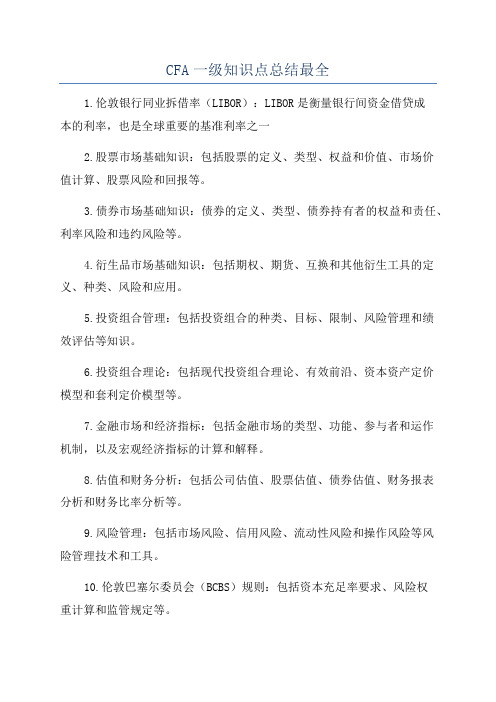
CFA一级知识点总结最全
1.伦敦银行同业拆借率(LIBOR):LIBOR是衡量银行间资金借贷成
本的利率,也是全球重要的基准利率之一
2.股票市场基础知识:包括股票的定义、类型、权益和价值、市场价
值计算、股票风险和回报等。
3.债券市场基础知识:债券的定义、类型、债券持有者的权益和责任、利率风险和违约风险等。
4.衍生品市场基础知识:包括期权、期货、互换和其他衍生工具的定义、种类、风险和应用。
5.投资组合管理:包括投资组合的种类、目标、限制、风险管理和绩
效评估等知识。
6.投资组合理论:包括现代投资组合理论、有效前沿、资本资产定价
模型和套利定价模型等。
7.金融市场和经济指标:包括金融市场的类型、功能、参与者和运作
机制,以及宏观经济指标的计算和解释。
8.估值和财务分析:包括公司估值、股票估值、债券估值、财务报表
分析和财务比率分析等。
9.风险管理:包括市场风险、信用风险、流动性风险和操作风险等风
险管理技术和工具。
10.伦敦巴塞尔委员会(BCBS)规则:包括资本充足率要求、风险权
重计算和监管规定等。
11.道德和专业行为:包括CFA协会的道德和专业行为准则,以及投资专业人士的职业道德标准。
以上是CFA一级考试的主要知识点总结。
考生需要熟悉这些知识点,并进行系统的学习和准备,以便能够顺利通过考试。
同时,还需要进行大量的练习题和模拟考试,提高自己的应试能力。
希望以上内容对CFA一级考试的备考有所帮助。
9A1B学霸分享CFA一级备考经验!
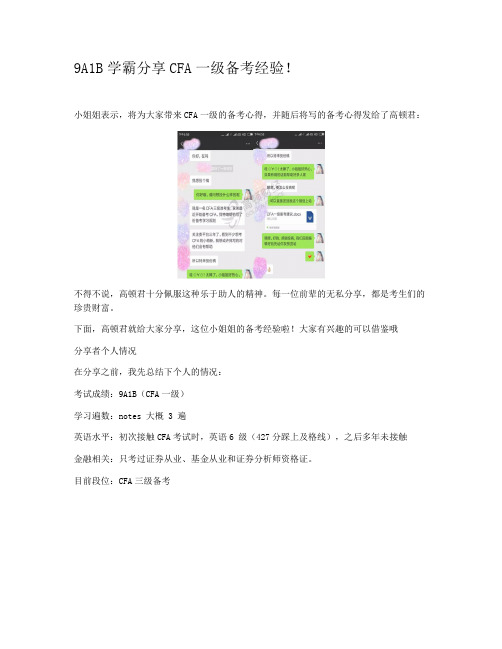
9A1B学霸分享CFA一级备考经验!小姐姐表示,将为大家带来CFA一级的备考心得,并随后将写的备考心得发给了高顿君:不得不说,高顿君十分佩服这种乐于助人的精神。
每一位前辈的无私分享,都是考生们的珍贵财富。
下面,高顿君就给大家分享,这位小姐姐的备考经验啦!大家有兴趣的可以借鉴哦分享者个人情况在分享之前,我先总结下个人的情况:考试成绩:9A1B(CFA一级)学习遍数:notes 大概 3 遍英语水平:初次接触CFA考试时,英语6 级(427分踩上及格线),之后多年未接触金融相关:只考过证券从业、基金从业和证券分析师资格证。
目前段位:CFA三级备考下面,进入正式分享。
学习资料采用在学习之前,选对学习材料是成功的第一步。
以下资料是常用的学习资料,除了官方教材,我建议都要准备(中文教材如果英文足够好,有金融底子,可以不用)。
Schweser notes:★★★★☆CFA一级中文教材:★★★☆☆官方教材:★☆☆☆☆我觉得一级没必要看,notes能够涵括99%的考点官方教材课后习题:★★★★★这个习题强烈推荐,在看书过程中必做。
网课视频:★★★★☆必看。
看一小时网课,抵你看三四个小时的书,效率要高的多。
CFA官网mock题:★★★★★一开始做发现有点难度。
可以留着最后模拟用,提升信心,做了几套,你会发现大部分题目重复,难度也是大于等于真题。
学习进度现在再来说说科目学习的进程应该如何安排。
众所周知,CFA考试一共十个科目,我先就我个人的理解讲讲这些科目的难度。
困难科目:固定收益财务报告及分析衍生品投资(该科目难在概念很难理解,但考试的题目往往容易得多)。
中等难度的科目:伦理道德经济学定量分析简单的科目:投资组合管理公司金融另类投资权益投资再来看看2019年你们将考的CFA考试,各科的分值权重:(2019年CFA一级考试个科目权重分配)注:权重越高,考试中题目越多整体来说,我将权重比较大的科目放在前面,但也会结合科目难度做调整。
16周轻松搞定CFA LEVEL 1 (第1~16周 全)(保罗时报)
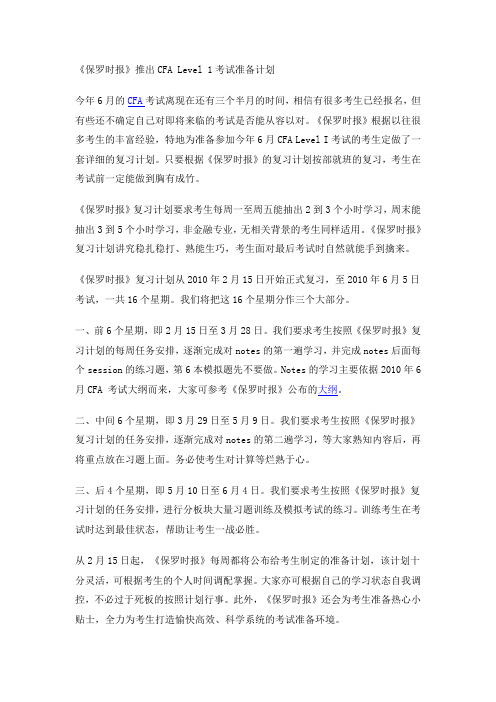
《保罗时报》推出CFA Level 1考试准备计划今年6月的CFA考试离现在还有三个半月的时间,相信有很多考生已经报名,但有些还不确定自己对即将来临的考试是否能从容以对。
《保罗时报》根据以往很多考生的丰富经验,特地为准备参加今年6月CFA Level I考试的考生定做了一套详细的复习计划。
只要根据《保罗时报》的复习计划按部就班的复习,考生在考试前一定能做到胸有成竹。
《保罗时报》复习计划要求考生每周一至周五能抽出2到3个小时学习,周末能抽出3到5个小时学习,非金融专业,无相关背景的考生同样适用。
《保罗时报》复习计划讲究稳扎稳打、熟能生巧,考生面对最后考试时自然就能手到擒来。
《保罗时报》复习计划从2010年2月15日开始正式复习,至2010年6月5日考试,一共16个星期。
我们将把这16个星期分作三个大部分。
一、前6个星期,即2月15日至3月28日。
我们要求考生按照《保罗时报》复习计划的每周任务安排,逐渐完成对notes的第一遍学习,并完成notes后面每个session的练习题,第6本模拟题先不要做。
Notes的学习主要依据2010年6月CFA 考试大纲而来,大家可参考《保罗时报》公布的大纲。
二、中间6个星期,即3月29日至5月9日。
我们要求考生按照《保罗时报》复习计划的任务安排,逐渐完成对notes的第二遍学习,等大家熟知内容后,再将重点放在习题上面。
务必使考生对计算等烂熟于心。
三、后4个星期,即5月10日至6月4日。
我们要求考生按照《保罗时报》复习计划的任务安排,进行分板块大量习题训练及模拟考试的练习。
训练考生在考试时达到最佳状态,帮助让考生一战必胜。
从2月15日起,《保罗时报》每周都将公布给考生制定的准备计划,该计划十分灵活,可根据考生的个人时间调配掌握。
大家亦可根据自己的学习状态自我调控,不必过于死板的按照计划行事。
此外,《保罗时报》还会为考生准备热心小贴士,全力为考生打造愉快高效、科学系统的考试准备环境。
CFA考试、学习、报名、教材、notes常见问题
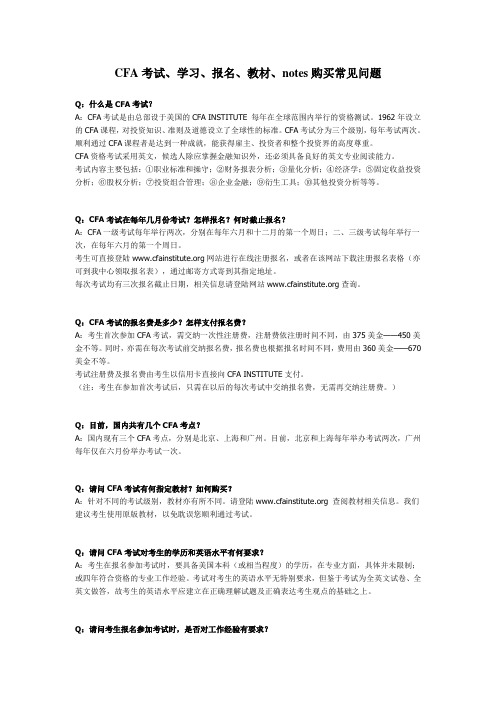
CFA考试、学习、报名、教材、notes购买常见问题Q:什么是CFA考试?A:CFA考试是由总部设于美国的CFA INSTITUTE 每年在全球范围内举行的资格测试。
1962年设立的CFA课程,对投资知识、准则及道德设立了全球性的标准。
CFA考试分为三个级别,每年考试两次。
顺利通过CFA课程者是达到一种成就,能获得雇主、投资者和整个投资界的高度尊重。
CFA资格考试采用英文,候选人除应掌握金融知识外,还必须具备良好的英文专业阅读能力。
考试内容主要包括:①职业标准和操守;②财务报表分析;③量化分析;④经济学;⑤固定收益投资分析;⑥股权分析;⑦投资组合管理;⑧企业金融;⑨衍生工具;⑩其他投资分析等等。
Q:CFA考试在每年几月份考试?怎样报名?何时截止报名?A:CFA一级考试每年举行两次,分别在每年六月和十二月的第一个周日;二、三级考试每年举行一次,在每年六月的第一个周日。
考生可直接登陆网站进行在线注册报名,或者在该网站下载注册报名表格(亦可到我中心领取报名表),通过邮寄方式寄到其指定地址。
每次考试均有三次报名截止日期,相关信息请登陆网站查询。
Q:CFA考试的报名费是多少?怎样支付报名费?A:考生首次参加CFA考试,需交纳一次性注册费,注册费依注册时间不同,由375美金——450美金不等。
同时,亦需在每次考试前交纳报名费,报名费也根据报名时间不同,费用由360美金——670美金不等。
考试注册费及报名费由考生以信用卡直接向CFA INSTITUTE支付。
(注:考生在参加首次考试后,只需在以后的每次考试中交纳报名费,无需再交纳注册费。
)Q:目前,国内共有几个CFA考点?A:国内现有三个CFA考点,分别是北京、上海和广州。
目前,北京和上海每年举办考试两次,广州每年仅在六月份举办考试一次。
Q:请问CFA考试有何指定教材?如何购买?A:针对不同的考试级别,教材亦有所不同。
请登陆 查阅教材相关信息。
我们建议考生使用原版教材,以免耽误您顺利通过考试。
CFA一级内容:CFA历年考试模拟题(一)
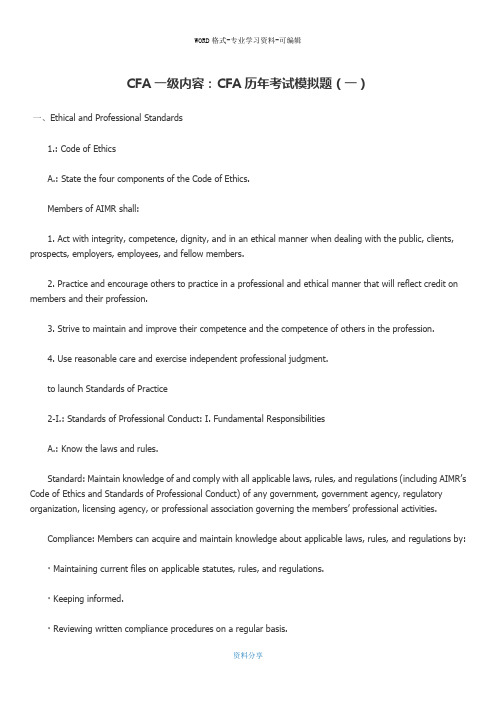
CFA一级内容:CFA历年考试模拟题(一)一、Ethical and Professional Standards1.: Code of EthicsA.: State the four components of the Code of Ethics.Members of AIMR shall:1. Act with integrity, competence, dignity, and in an ethical manner when dealing with the public, clients, prospects, employers, employees, and fellow members.2. Practice and encourage others to practice in a professional and ethical manner that will reflect credit on members and their profession.3. Strive to maintain and improve their competence and the competence of others in the profession.4. Use reasonable care and exercise independent professional judgment.to launch Standards of Practice2-I.: Standards of Professional Conduct: I. Fundamental ResponsibilitiesA.: Know the laws and rules.Standard: Maintain knowledge of and comply with all applicable laws, rules, and regulations (including AIMR’s Code of Ethics and Standards of Professional Conduct) of any government, government agency, regulatory organization, licensing agency, or profes sional association governing the members’ professional activities.Compliance: Members can acquire and maintain knowledge about applicable laws, rules, and regulations by:· Maintaining current files on applicable statutes, rules, and regulations.· Keeping informed.· Reviewing written compliance procedures on a regular basis.B.: Don't break or help others break the law.Standard: Not knowingly participate or assist in any violation of such laws, rules, or regulations.Compliance: When members suspect a client or a colleague of planning or engaging in ongoing illegal activities, members should take the following actions:· Consult counsel to determine if the conduct is, in fact, illegal.· Disassociate from any illegal or unethical activity. When members have reasonable grounds to believe that a client’s or employee’s activities are illegal or unethical, the members should dissociate from these activities and urge their firm to attempt to persuade the perpetrator to cease such activity.2-II.: Standards of Professional Conduct: II. Relationships with and Responsibilities to the ProfessionA.: Use of Professional DesignationII(A.1)AIMR members may reference their membership only in a dignified and judicious manner. The use of the reference may be accompanied by an accurate explanation of the requirements that have been met to obtain membership in these organizations.II(A.2)Those who have earned the right to use the Chartered Financial Analyst designation may use the marks “Chartered Financial Analyst” or “CFA” and are encouraged to do so, but only in a proper, dignified, and judicious manner. The use of the designation may be accompanied by an accurate explanation of the requirements that have been met to obtain the right to use the designation.II(A.3)Candidates in the CFA Program, as defined in the AIMR Bylaws, may reference their participation in the CFA Program, but the reference must clearly state that an individual is a candidate in the CFA Program and cannot imply that the candidate has achieved any type of partial designation.B.: Professional MisconductII(B.1)Members shall not engage in any professional conduct involving dishonesty, fraud, deceit, or misrepresentation or commit any act that reflects adversely on their honesty, trustworthiness, or professional competence.II(B.2)Members and candidates shall not engage in any conduct or commit any act that compromises the integrity of the CFA designation or the integrity or validity of the examinations leading to the award of the right to use the CFA designation.Compliance:1. Make clear that dishonest personal behavior reflects poorly on the profession.2. Adopt a code of ethics to which every employee must subscribe.3. Conduct background checks on potential employees to ensure that they are of good character and eligible to work in the investment industry.C.: Prohibition against PlagiarismStandard: Members shall not copy or use, in substantially the same form as the original, material prepared by another without acknowledging and identifying the name of the author, publisher, or source of such material. Members may use, without acknowledgment, factual information published by recognized financial and statistical reporting services or similar sources.Compliance:1. Maintain copies of materials that were relied on in preparing the research report.2. Attribute quotations (and projections, tables, statistics, models, and methodologies) used other than recognized financial and statistical reporting services.3. Attribute paraphrases and summaries of material prepared by others.2-III.: Standards of Professional Conduct: III. Relationships and Responsibilities to the EmployerA.: Inform your Employer of the Code and StandardsIII(A.1)Members shall inform their employer in writing, through their direct supervisor, that they are obligated to comply with the Code and Standards and are subject to disciplinary sanctions for violations thereof.III(A.2)Members shall deliver a copy of the Code and Standards to their employer if the employer does not have a copy.Compliance: Members should notify their supervisor in writing of the Code and Standards and the member’s responsibility to follow them. The member should also suggest that the employers adopt the Code and Standards and disseminate it throughout the firm. If the employer has publicly acknowledged, in writing, that they have adopted AIMR’s Code and Standards as part of the firm’s policies then the member need not give the formal written notification as required by III(A).B.: Duty to EmployerStandard: Members shall not undertake any independent practice that could result in compensation or other benefit in competition with their employer unless they obtain written consent from both their employer and the persons or entities for whom they undertake independent practice.Compliance:1. Members who plan to engage in independent practice for compensation should provide written statements to their employer describing the types of services they will perform, the expected duration of the services, and the compensation they will receive.2. Members should also disclose to their prospective clients the identity of their employer, the fact that they are performing independently of the employer, and what their employer would charge for similar services.3. Members seeking new employment should not contact existing clients or potential clients prior to leaving their employer or take records/files to their new employer without the written permission of the previous employer.C.: Disclose Conflicts between you and your EmployerIII(C.1):Members shall disclose to their employer all matters, including beneficial ownership of securities or other investments, that reasonably could be expected to interfere with their duty to their employer or ability to make unbiased and objective recommendations.III(C.2):Members shall comply with any prohibitions on activities imposed by their employer if a conflict of interest exists.Compliance: Members should report to their employers any beneficial interest and any special relationships, like corporate directorships, that may reasonably be considered a conflict of interest with their responsibilities. Members should also discuss the situation with their firm’s compliance officer before taking any action that could lead to a conflict of interest.D.: Disclose Additional Compensation from Outside the Firm to your EmployerStandard: Members shall disclose to their employer in writing all monetary compensation or other benefits that they receive for their services that are in addition to compensation or benefits conferred by a member’s employer.Compliance: Members should make an immediate written report to their employer specifying any compensation or benefits they receive or propose to receive for services in addition to what their employer is to give them. This written report should state the terms of any oral or written agreement, the amount of compensation, and the duration of the agreement.E.: Responsibilities of SupervisorsStandard: Members with supervisory responsibilities, authority, or the ability to influence the conduct of others shall exercise reasonable supervision over those subject to their supervision or authority to prevent any violation of applicable statutes, regulation, or provisions of the Code and Standards. In so doing, members are entitled to rely on reasonable procedures designed to detect and prevent such violations.Compliance: The supervisor and the compliance officer should:1. Disseminate the compliance procedures.2. Update the procedures as necessary.3. Educate the staff and issue periodic reminders.4. Incorporate a professional conduct evaluation into the employee’s performance review.5. Review employee actions to ensure compliance and identify violators, initiating procedures once a violation has occurred. A supervisor should respond promptly to the violation by conducting a thorough investigation, and placing limitations on the wrongdoer until the investigation is complete.2-IV.: Standards of Professional Conduct: IV. Relationships with and Responsibilities to Clients and ProspectsA.: The Investment ProcessIV(A.1) Reasonable Basis and Representations. Members shall:a. Exercise diligence and thoroughness in making investment recommendations or in taking investment actions.b. Have a reasonable and adequate basis, supported by appropriate research and investigation, for such recommendations or actions.c. Make reasonable and diligent efforts to avoid any material misrepresentation in any research report or investment recommendation.d. Maintain appropriate records to support the reasonableness of such recommendations or actions.Compliance:1. Analyze the investment’s basic characteristics (records must show the characteristics of the investment and the basis for the recommendation).2. Analyze the needs of the portfolio (includes the client’s needs, as well as the needs of the total portfolio).3. Maintain files to support investment recommendations.IV(A.2) Research Reports. Members shall:a. Use reasonable judgment regarding the inclusion or exclusion of relevant factors in research reports.b. Distinguish between facts and opinions in research reports.c. Indicate the basic characteristics of the investment involved when preparing for public distribution a research report that is not directly related to a specific portfolio or client.Compliance: Members should consider including the following information in research reports:1. Expected annual rates of return, calculated on a total return basis.2. Annual income expectations.3. Current rate of return or yield.4. The degree of uncertainty associated with the cash flows, and other risk factors.5. The investment’s marketability or liquidity.IV(A.3) Independence and Objectivity. Members shall use reasonable care and judgment to achieve and maintain independence and objectivity in making investment recommendations or taking investment actions.Compliance:1. Protect integrity of opinions. Reports should reflect the analyst’s unbiased opinion.2. Disclose all corporate relationships (i.e., directorships, underwriting arrangements or acting as a market maker).3. Disclose personal holdings and beneficial ownerships.4. Create a restricted list.5. Restrict special cost arrangements. Members should pay for their commercial transportation and hotel charges.6. Limit gifts (US$100 is the maximum acceptable value for a gift or gratuity).7. Restrict investments (strict limits should be imposed on private placements).8. Review procedures (supervise the personal investment activities of the employees).B.: Interactions with Clients and ProspectsIV(B.1) Fiduciary Duties: In relationships with clients, members shall use particular care in determining applicable fiduciary duty and shall comply with such duty as to those persons and interests to whom the duty is owed. Members must act for the benefit of their clients and place their clients' interests before their own.Compliance:1. Follow all applicable rules and laws.2. Establish the investment objectives of the client.3. Diversify.4. Deal fairly with all clients with respect to investment actions.5. Disclose all possible conflicts of interest.6. Disclose compensation arrangements.7. Preserve the confidentiality of client information.8. Maintain loyalty to the plan beneficiaries.IV(B.2) Portfolio Investment Recommendations and Actions: Members shall:a. Make a reasonable inquiry into a client's financial situation, investment experience, and investment objectives prior to making any investment recommendations and shall update this information as necessary, but no less frequently than annually, to allow the members to adjust their investment recommendations to reflect changed circumstances.b. Consider the appropriateness and suitability of investment recommendations or actions for each portfolio or client (including the needs and circumstances of the portfolio or client, the basic characteristics of the investment involved, and the basic characteristics of the total portfolio).c. Distinguish between facts and opinions in presenting recommendations.d. Disclose to clients and prospects the basic format and general principles of the investment processes by which securities are selected and portfolios are constructed and shall promptly disclose to clients and prospects any changes that might significantly affect those processes.Compliance: Know basic nature of your client; know objectives and constraints.IV(B.3) Fair Dealing: Members shall deal fairly and objectively with all clients and prospects when disseminating investment recommendations, disseminating material changes in prior investment recommendations, and taking investment action.Compliance:1. Limit the number of people privy to recommendations and changes.2. Shorten the time frame between initiation and dissemination.3. Publish personnel guidelines for pre-dissemination.4. Simultaneous dissemination.5. Establish rules about employee trading activities.6. Establish procedures for determining material changes.7. Maintain a list of clients and their holdings.8. Develop trade allocation procedures.9. Make sure one account is not being used to bail out other accounts.10.If the firm offers differing levels of service, this fact should be disclosed to all clients.IV(B.4) Priority of Transactions: Clients and employers shall have priority over transactions in securities or other investments of which a member is the beneficial owner so that such personal transactions do not operate adversely to their clients' or employer's interests. If members make a recommendation regarding the purchase or sale of a security or other investment, they shall give their clients and employer adequate opportunity to act on the recommendation before acting on their own behalf.Compliance:1. Define personal transactions.2. Define covered investments.3. Limit the number of access persons. “Fire Walls” should be built to prevent the flow of information from one group or department to other groups within the firm.4. Define prohibited transactions. The text specifically mentions equity based IPOs.5. Establish reporting procedures and prior-clearance requirements.6. Ensure that procedures will be enforced and establish disciplinary procedures.IV(B.5) Preservation of Confidentiality: Members shall preserve the confidentiality of information communicated by clients, prospects, or employers concerning matters within the scope of the client-member, prospect-member, or employer-member relationship unless the member receives information concerning illegal activities on the part of the client, prospect, or employer.Compliance: The simplest and most effective way to comply is to avoid discussing any information received from a client except to colleagues working on the same project.IV(B.6) Prohibition against Misrepresentation: Members shall not make any statements, orally or in writing that misrepresent:a. the services that they or their firms are capable of performing.b. their qualifications or the qualifications of their firm.c. the member's academic or professional credentials.Members shall not make or imply, orally or in writing, any assurances or guarantees regarding any investment except to communicate accurate information regarding the terms of the investment instrument and the issuer's obligations under the instrument.Compliance: Firms can provide guidance to employees who make written or oral presentations to clients or prospects by providing a written list of the firm’s available services and a description of the firm’s qualifications.IV(B.7) Disclosure of Conflicts to Clients and Prospects: Members shall disclose to their clients and prospects all matters, including beneficial ownership of securities or other investments, that reasonably could be expected to impair the member's ability to make unbiased and objective recommendations.Compliance: Members should report to their employers, clients, and prospects any material beneficial interest they may have in securities, corporate directorships, or other special relationships they may have with the companies they are recommending. Members should make the disclosures before they make any recommendations or take any investment actions regarding these investments.IV(B.8) Disclosure of Referral Fees: Members shall disclose to clients and prospects any consideration or benefit received by the member or delivered to others for the recommendation of any services to the client or prospect.Compliance:1. Disclose all agreements in writing to any client or prospect who has been referred.2. Describe in the disclosure the nature of the consideration and the estimated dollar value of the consideration.3. Consult a supervisor and legal counsel concerning any prospective arrangement regarding referral fees.2-V.: Standards of Professional Conduct: V. Relationships with and Responsibilities to the Investing PublicA.: Prohibition against Use of Material Nonpublic InformationStandard: Members who possess material nonpublic information related to the value of a security shall not trade or cause others to trade in that security if such trading would breach a duty or if the information was misappropriated or relates to a tender offer. If members receive material nonpublic information in confidence, they shall not breach that confidence by trading or causing others to trade in securities to which such information relates. Members shall make reasonable efforts to achieve public dissemination of material nonpublic information disclosed in breach of a duty.Compliance: Fire walls, minimum elements are:1. Control over interdepartmental communications.2. Review employee trading against restricted lists.3. Restrict proprietary trading while the firm is in possession of material nonpublic information.Additional procedures:1. Restrict personal and proprietary employee trading.2. Place securities on a restricted list when the firm has material nonpublic information.3. Disseminate material nonpublic information only to those with a need to know.4. Designate a supervisor who decides when trading is appropriate.B.: Performance presentationStandard:1. Members shall not make any statements, orally or in writing, that misrepresent the investment performance that they or their firms have accomplished or can reasonably be expected to achieve.2. If members communicate individual or firm performance information directly or indirectly to clients or prospective clients, or in a manner intended to be received by clients or prospective clients, members shall make every reasonable effort to assure that such performance information is a fair, accurate, and complete presentation of such performance.Compliance: Misrepresentation about the investment performance of the firm can be avoided if the member maintains data about the firm’s investment per formance in written form. Investment accounts should be combined into composites by investment class and risk groups.3: Standards of Practice Handbooka: Demonstrate a thorough knowledge of the Standards of Professional Conduct by recognizing and applying the Standards to specific situations.This is an application of many different ethics concepts to different scenarios. After having learned the ethics material in earlier learning outcomes you will be able to apply these concepts to various scenarios as you take the quizzes.b: Distinguish between conduct that conforms to the Code and the Standards and conduct that violates the Code and the Standards.This requires looking at different scenarios and possibly applying several ethics concepts to each scenario. After you learn and understand the ethics concepts you will be able to apply them to specific situations through the quizzes.4: AIMR Performance Presentation Standards Handbooka: Explain the goals of the AIMR-PPS Standards.The Standards have been designed to meet the following goals:· To achieve greater uniformity and comparability among performance presentations.· To improve the service offered to investment management clients.· To enhance the professionalism of the industry.· To bolster the notion of self-regulation.Note: The Presentation Standards are intended primarily to be performance presentation standards,not performance measurement standards. Portions of the AIMR-PPS are required while some are recommended. AIMR strongly encourages the adoption of both required and recommended components of the Standards. Also, performance presentations may have to provide more than the minimum requirements of the AIMR-PPS to meet the full intent of the Standards.b: Identify the parties affected by the AIMR-PPS standards.· Firms. The PPS Standards are voluntary. The PPS are widely recognized as fair and accurate reporting guidelines for investment performance.· AIMR Members, CFA Charterholders, and CFA Candidates. The PPS are not explicitly incorporated into the AIMR Code and Standards of Professional Conduct. The PPS does, however, help insure that members, charterholders and candidates are in compliance with Standard V(B), Performance Presentation, so that they will make no material misrepresentation of their performance results.· Prospective and Current Clients. The PPS helps clients compare investment performance across firms. The PPS helps clients evaluate their investment manager’s performance.c: Identify the four main topics of the AIMR-PPS standards (i.e., creation and maintenance of composites, calculation of returns, presentation of results, and disclosures).· Creation and maintenance of composites. A composite is a set of portfolios that follow the same investment style.· Calculation of returns.· Presentation of results.· Disclosures.To claim compliance, firms must meet all composite, calculation, presentation, and disclosure requirements. Adherence to the basic requirements, however, does not guarantee fair and adequate performance reporting. Compliance with the standards also requires adherence to all applicable laws and regulations.If the firm has made every reasonable effort to ensure that their performance presentation is in compliance with the PPS, the firm can use the following legend:?XYZ Firm has prepared and presented this report in compliance with the Performance Presentation Standards of the Association for Investment Management and Research. AIMR has not been involved with the preparation or review of this report.· Any use of the mark “AIMR” except as shown above is prohibited.· If results are not in full compliance, performance cannot be presented as: Being in compliance with the AIMR-PPS except for …· Statements referring to the calculation methodology used in a presentation as being in accordance or compliance with AIMR-PPS standards are prohibited.· AIMR members who misuse the term AIMR, AIMR-PPS standards, or the Compliance Statement are subject to disciplinary sanctions under Standard V(B).各位考生,2015年CFA备考已经开始,为了方便各位考生能更加系统地掌握考试大纲的重点知识,帮助大家充分备考,体验实战,高顿网校开通了全免费的CFA题库(包括精题真题和全真模考系统),题库里附有详细的答案解析,学员可以通过多种题型加强练习,通过针对性地训练与模考,对学习过程进行全面总结。
cfa二级备考
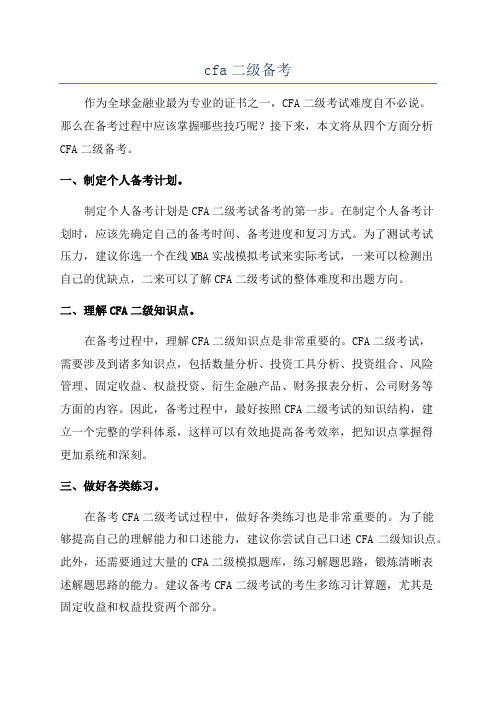
cfa二级备考作为全球金融业最为专业的证书之一,CFA二级考试难度自不必说。
那么在备考过程中应该掌握哪些技巧呢?接下来,本文将从四个方面分析CFA二级备考。
一、制定个人备考计划。
制定个人备考计划是CFA二级考试备考的第一步。
在制定个人备考计划时,应该先确定自己的备考时间、备考进度和复习方式。
为了测试考试压力,建议你选一个在线MBA实战模拟考试来实际考试,一来可以检测出自己的优缺点,二来可以了解CFA二级考试的整体难度和出题方向。
二、理解CFA二级知识点。
在备考过程中,理解CFA二级知识点是非常重要的。
CFA二级考试,需要涉及到诸多知识点,包括数量分析、投资工具分析、投资组合、风险管理、固定收益、权益投资、衍生金融产品、财务报表分析、公司财务等方面的内容。
因此,备考过程中,最好按照CFA二级考试的知识结构,建立一个完整的学科体系,这样可以有效地提高备考效率,把知识点掌握得更加系统和深刻。
三、做好各类练习。
在备考CFA二级考试过程中,做好各类练习也是非常重要的。
为了能够提高自己的理解能力和口述能力,建议你尝试自己口述CFA二级知识点。
此外,还需要通过大量的CFA二级模拟题库,练习解题思路,锻炼清晰表述解题思路的能力。
建议备考CFA二级考试的考生多练习计算题,尤其是固定收益和权益投资两个部分。
四、制定学习计划。
制定学习计划也是CFA二级考试备考不可缺少的步骤。
通过制定学习计划,你可以合理地利用自己的时间和资源,避免在学习过程中遇到不必要的瓶颈。
同时,建议你在制定学习计划时,注重平衡。
因为备考CFA二级考试需要投入大量的精力和时间,但也不能完全放弃其他方面的事务。
建议你在学习计划中注意时间分配,合理分配每天的时间;适当安排其他业余活动,帮助自己缓解压力,保持心态开放和放松。
以上就是CFA二级备考的基本技巧,随着CFA证书的普及度越来越高,备考难度相应也越来越大。
但在备考过程中,拥有正确的备考方法和心态是关键,只有坚持努力,多做练习,才能够提高备考效率,进而更好地应对CFA二级考试的挑战。
cfa一级题型2023
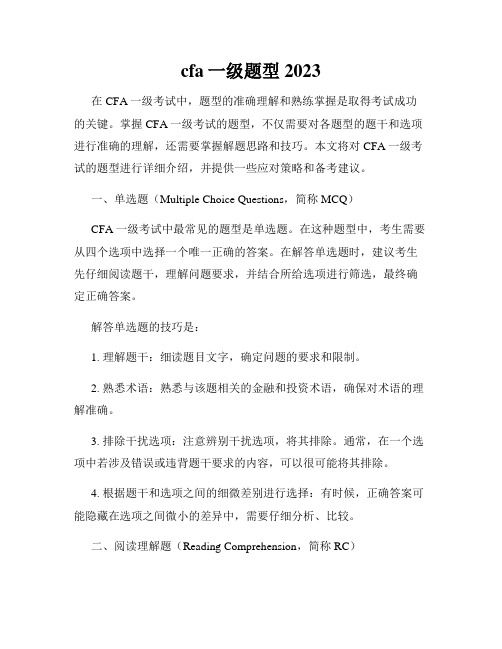
cfa一级题型2023在CFA一级考试中,题型的准确理解和熟练掌握是取得考试成功的关键。
掌握CFA一级考试的题型,不仅需要对各题型的题干和选项进行准确的理解,还需要掌握解题思路和技巧。
本文将对CFA一级考试的题型进行详细介绍,并提供一些应对策略和备考建议。
一、单选题(Multiple Choice Questions,简称MCQ)CFA一级考试中最常见的题型是单选题。
在这种题型中,考生需要从四个选项中选择一个唯一正确的答案。
在解答单选题时,建议考生先仔细阅读题干,理解问题要求,并结合所给选项进行筛选,最终确定正确答案。
解答单选题的技巧是:1. 理解题干:细读题目文字,确定问题的要求和限制。
2. 熟悉术语:熟悉与该题相关的金融和投资术语,确保对术语的理解准确。
3. 排除干扰选项:注意辨别干扰选项,将其排除。
通常,在一个选项中若涉及错误或违背题干要求的内容,可以很可能将其排除。
4. 根据题干和选项之间的细微差别进行选择:有时候,正确答案可能隐藏在选项之间微小的差异中,需要仔细分析、比较。
二、阅读理解题(Reading Comprehension,简称RC)阅读理解题是CFA一级考试的另一个常见题型。
在这种题型中,考生需要阅读并理解一篇短文,然后回答相关的问题。
阅读理解题的关键在于快速而准确地理解文章内容,抓住问题的关键点。
解答阅读理解题的技巧是:1. 抓住文章的主旨:仔细阅读文章,了解文章的主题和观点,抓住核心内容。
2. 强调和关键词:注意文章中的强调词和关键词,它们通常会帮助你找到正确答案。
3. 避免过度解读:不要为文章过度解读,尽可能在文章中找到确凿的信息来回答问题。
4. 注意题目顺序:通常,问题的顺序与相关的信息在文章中出现的顺序是一致的,所以可以帮助你更快地找到答案。
三、填空题(Item Set,简称IS)填空题是CFA一级考试中较为常见的题型之一。
在这种题型中,考生需要从一系列给定的选项中选择出正确的答案,填写到相应的空格中。
cfa考试科目和内容

cfa考试科目和内容CFA考试科目CFA考试科目包括十个科目,分别是:道德与职业行为标准、经济学、投资组合管理、权益投资、固定收益投资、衍生工具、另类投资、投资业绩衡量与归因以及估值与投资技术。
考试内容非常广泛,涵盖了金融投资领域的各个方面。
CFA考试内容CFA协会定期对全球的特许金融分析师进行职业分析,以确定课程中的投资知识体系和技能在特许金融分析师的工作实践中是否重要。
考生的Body of Knowledge TM(知识体系)主要由四部分内容组成:伦理和职业道德标准、投资工具(包括权益类证券产品、固定收益产品、金融衍生产品及其他类投资产品)、资产估值(含数量分析方法、经济学、财务报表分析及公司金融)、投资组合管理及投资业绩报告。
CFA一级考试课程着重于投资评估和管理的工具,还包括资产估值和投资组合管理技巧的入门介绍。
一级考试(Level 1)形式为选择题(Multiple Choice),每卷各90题,共180题;CFA二级考试课程着重于资产估值及投资工具的应用。
二级考试(Level 2)形式为案例选择题(Multiple Choice),每卷各60题,共120题;CFA三级考试内容为前两组内容的综合总结。
三级考试(Level 3)形式为分为两个部分,上午部分包括简答题和计算题两大类,下午部分与二级形式一致10道Item Set,每题6个小题,共60道题。
CFA特许金融分析师的三个级别考什么内容CFA特许金融分析师的三个级别分别是:一级、二级和三级。
一级考试重点考察投资评估和管理的工具和技术,包括资产评估、投资组合管理以及投资表现评估。
二级考试重点考察资产评估和投资组合管理的具体知识领域,包括债券、股票、衍生工具等投资产品的评估和管理。
三级考试重点考察资产评估和投资组合管理的深入知识领域,包括投资组合管理、投资表现评估以及为客户提供投资建议等。
特许金融分析师考试成绩多少分及格?(1)考试成绩分为"Pass"或者"Fail";(2)评分体系:CFA考试中会对各个科目单独评分,每个科目的成绩分为三档:小于等于50%、51%至70%、大于70%;(3)CFA协会会把考生各个科目成绩汇总做加权平均,从而评判考生是否能通过考试;(4)CFA协会官方尚没公布具体的通过标准;(5)以下标准为根据历年考生的实际通过情况进行估算的:考生正确的答案数量=全球成绩排名前1%的考生的平均正确答案数量的70%。
史上最全的CFA复习笔记
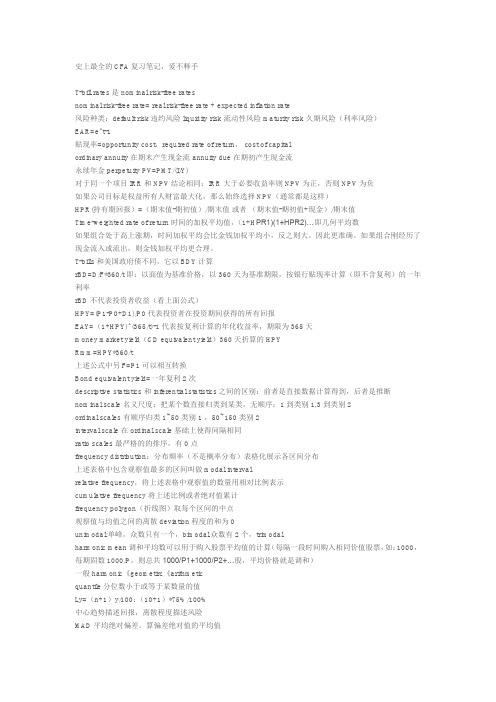
史上最全的CFA复习笔记,爱不释手T-bill rates是 nominal risk-free ratesnominal risk-free rate= real risk-free rate + expected inflation rate风险种类:default risk违约风险 liquidity risk 流动性风险 maturity risk 久期风险(利率风险)EAR=e^t-1贴现率=opportunity cost,required rate of return, cost of capitalordinary annuity在期末产生现金流 annuity due在期初产生现金流永续年金perpetuity PV=PMT/(I/Y)对于同一个项目IRR和NPV结论相同:IRR大于必要收益率则NPV为正,否则NPV为负如果公司目标是权益所有人财富最大化,那么始终选择NPV(通常都是这样)HPR(持有期回报)=(期末值-期初值)/期末值或者(期末值-期初值+现金)/期末值Time-weighted rate of return时间的加权平均值,(1+H PR1)(1+HPR2)…即几何平均数如果组合处于高上涨期,时间加权平均会比金钱加权平均小,反之则大。
因此更准确。
如果组合刚经历了现金流入或流出,则金钱加权平均更合理。
T-bills和美国政府债不同,它以BDY计算rBD=D/F*360/t即:以面值为基准价格,以360天为基准期限,按银行贴现率计算(即不含复利)的一年利率rBD不代表投资者收益(看上面公式)HPY=(P1-P0+D1)/P0代表投资者在投资期间获得的所有回报EAY=(1+HPY)^(365/t)-1代表按复利计算的年化收益率,期限为365天money market yield(CD equivalent yield)360天折算的HPYRmm=HPY*360/t上述公式中另F=P1可以相互转换Bond equivalent yield=一年复利2次descriptive statistics 和 inferential statistics之间的区别:前者是直接数据计算得到,后者是推断nominal scale名义尺度:把某个数直接归类到某类,无顺序:1到类别1,3到类别2ordinal scales 有顺序归类1~50类别1 ,50~150类别2interval scale 在ordinal scale基础上使得间隔相同ratio scales 最严格的的排序,有0点frequency distribution:分布频率(不是概率分布)表格化展示各区间分布上述表格中包含观察值最多的区间叫做modal intervalrelative frequency,将上述表格中观察值的数量用相对比例表示cumulative frequency 将上述比例或者绝对值累计frequency polygon(折线图)取每个区间的中点观察值与均值之间的离散deviation程度的和为0unimodal:单峰,众数只有一个,bimodal众数有2个,trimodalharmonic mean调和平均数可以用于购入股票平均值的计算(每隔一段时间购入相同价值股票,如:1000,每期固数1000/P,则总共1000/P1+1000/P2+…股,平均价格就是调和)一般harmonic《geometirc《arithmeticquantile分位数小于或等于某数量的值Ly=(n+1)y/100:(10+1)*75%/100%中心趋势描述回报,离散程度描述风险MAD平均绝对偏差。
cfa一级报名条件
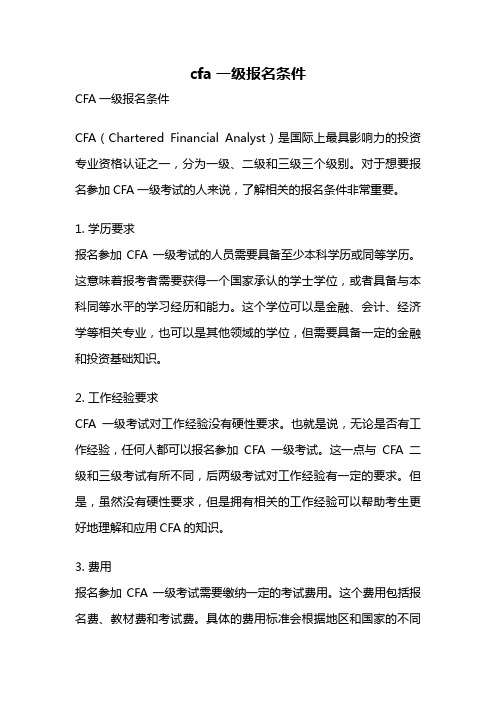
cfa一级报名条件CFA一级报名条件CFA(Chartered Financial Analyst)是国际上最具影响力的投资专业资格认证之一,分为一级、二级和三级三个级别。
对于想要报名参加CFA一级考试的人来说,了解相关的报名条件非常重要。
1. 学历要求报名参加CFA一级考试的人员需要具备至少本科学历或同等学历。
这意味着报考者需要获得一个国家承认的学士学位,或者具备与本科同等水平的学习经历和能力。
这个学位可以是金融、会计、经济学等相关专业,也可以是其他领域的学位,但需要具备一定的金融和投资基础知识。
2. 工作经验要求CFA一级考试对工作经验没有硬性要求。
也就是说,无论是否有工作经验,任何人都可以报名参加CFA一级考试。
这一点与CFA二级和三级考试有所不同,后两级考试对工作经验有一定的要求。
但是,虽然没有硬性要求,但是拥有相关的工作经验可以帮助考生更好地理解和应用CFA的知识。
3. 费用报名参加CFA一级考试需要缴纳一定的考试费用。
这个费用包括报名费、教材费和考试费。
具体的费用标准会根据地区和国家的不同而有所差异,考生需要根据自己所在的地区和国家进行查询并缴纳相应的费用。
同时,考生还可以选择购买CFA官方提供的教材,以便更好地准备考试。
4. 报名流程报名参加CFA一级考试需要按照官方规定的流程进行操作。
首先,考生需要在官方网站上注册一个账号,并填写相关的个人信息。
然后,需要选择参加的考试地点和日期,并缴纳相应的考试费用。
之后,考生会收到一封确认邮件,确认报名成功。
在考试前,考生还需要下载并安装一份特定的软件,用于在线考试。
考试结束后,考生可以在官方网站上查询考试成绩。
5. 报名时间CFA一级考试有两个考试窗口,分别是6月和12月。
考生可以根据自己的时间安排,在这两个窗口中选择一个适合自己的考试日期。
通常,官方会提前几个月公布具体的报名时间和考试日期,考生需要及时关注官方消息,以便按时进行报名。
总结起来,报名参加CFA一级考试需要具备至少本科学历或同等学历,没有硬性的工作经验要求,需要缴纳一定的考试费用,并按照官方规定的流程进行报名操作。
cfa一级报名条件

cfa一级报名条件CFA一级报名条件CFA(Chartered Financial Analyst)是国际上公认的金融领域最具权威性的资格认证之一。
想要报考CFA一级考试,考生需要满足一定的报名条件。
本文将就CFA一级报名条件进行详细阐述。
报考CFA一级考试的考生需具备学历要求。
CFA协会要求考生至少拥有本科学历,或者正在攻读本科学位。
这意味着只有具备本科学历或在校本科生才有资格报名参加CFA一级考试。
此外,无论是国内还是国外的学历均可满足报名条件。
考生还需具备相关工作经验。
CFA协会要求报考CFA一级考试的考生需具有至少4年相关工作经验,或者正在参与与金融相关的工作。
这是为了保证考生在报考CFA一级考试时具备一定的实际工作经验,能够更好地理解和应用所学知识。
考生还需具备良好的英语水平。
CFA一级考试全程使用英文进行,包括考试内容和考试材料。
因此,考生需要具备良好的英语听、说、读、写能力。
为了确保考生具备足够的英语水平,CFA协会要求考生提供英语水平证明,如托福、雅思成绩或其他等同证明。
考生还需要支付一定的报名费用。
CFA一级考试的报名费用较高,考生需要支付一定的费用才能完成报名。
具体的费用标准可在CFA 协会官网上查询,考生需要提前做好经济准备。
考生还需接受CFA协会的守则和道德规范。
CFA协会高度重视道德规范,要求所有考生遵守CFA协会的守则,保持高尚的道德品质和职业操守。
考生在报名时需要同意并遵守相关规定,确保自己在考试过程中能够遵守道德规范。
想要报考CFA一级考试,考生需要满足学历要求、工作经验要求和英语水平要求,并支付一定的报名费用。
同时,考生还需遵守CFA 协会的守则和道德规范。
只有满足这些条件的考生才能成功报名参加CFA一级考试。
希望本文对您了解CFA一级报名条件有所帮助。
cfa备考经验分享

cfa备考经验分享CFA备考经验分享一、CFA考试概述Chartered Financial Analyst(特许金融分析师,简称CFA)是全球金融领域最具权威和市场价值的职业资格证书。
CFA考试分为三级,由CFA协会组织,每年6月和12月各考一次,考试时间为3-6小时不等。
CFA考试的内容涵盖财务报表、投资组合、估值、道德标准等方面的知识,对考生的综合素质和实际能力要求很高,因此备考难度较大。
二、备考时间分配CFA备考需要足够的时间和耐心,一般需要6-12个月左右。
备考时间应该根据考试科目和自身情况进行分配,可以采用按周或按月的计划。
一般来说,每周需要投入10-20个小时的时间来复习,考前一个月需要全力以赴地备考。
此外,一定要准备足够的备考材料和模拟试题,以便巩固所学知识。
三、备考方法1.有目的地阅读教材。
CFA备考的教材是考试的核心,需要重点阅读和理解。
不要仅仅停留在字面理解,要注重理解教材背后的意义和思想。
2.做好笔记。
在阅读教材的同时,要做好笔记,将重点、难点、易错点等记录下来。
笔记要做到清晰、简洁、易读。
3.学习复习视频。
CFA备考的复习视频很有用,可以加深对教材的理解和应用,同时也能够提高效率。
4.做题。
做题是巩固所学知识和检验自己水平的重要方法,备考期间要进行大量的模拟试题和真题练习,可以在做题的过程中,找出自己不足之处,及时补充和弥补。
5.组建学习小组。
有团队氛围和交流互动,可以激活学习动力,促进知识的相互学习和交流。
四、备考心态1.态度端正。
CFA备考是一个漫长而艰巨的过程,需要具有强烈的自我驱动力和坚定的意志力。
不抱有侥幸心理,不抄袭他人作业,以认真和严谨的态度对待备考。
2.培养自律性。
备考需要自律,要有计划、有步骤地投入备考,时刻保持自我激励,避免外界干扰和诱惑。
3.保持积极心态。
备考中会遇到各种挑战和困难,对待困难的态度决定了备考结果的差异。
要积极面对挑战和困难,保持良好的心态和情绪。
cfa二级知识笔记
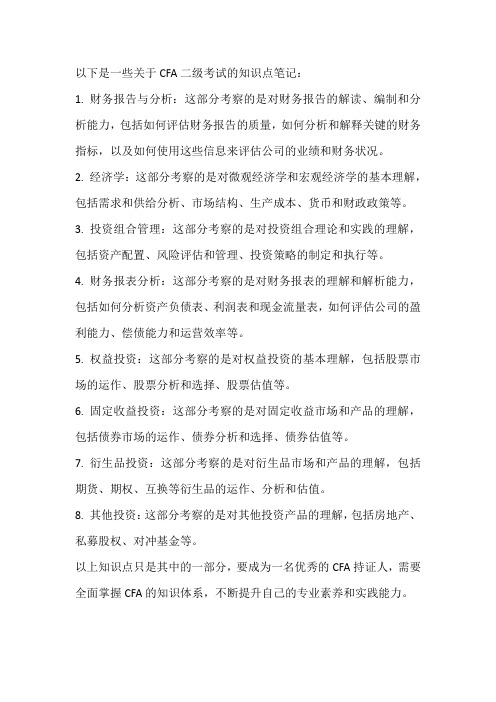
以下是一些关于CFA二级考试的知识点笔记:
1. 财务报告与分析:这部分考察的是对财务报告的解读、编制和分析能力,包括如何评估财务报告的质量,如何分析和解释关键的财务指标,以及如何使用这些信息来评估公司的业绩和财务状况。
2. 经济学:这部分考察的是对微观经济学和宏观经济学的基本理解,包括需求和供给分析、市场结构、生产成本、货币和财政政策等。
3. 投资组合管理:这部分考察的是对投资组合理论和实践的理解,包括资产配置、风险评估和管理、投资策略的制定和执行等。
4. 财务报表分析:这部分考察的是对财务报表的理解和解析能力,包括如何分析资产负债表、利润表和现金流量表,如何评估公司的盈利能力、偿债能力和运营效率等。
5. 权益投资:这部分考察的是对权益投资的基本理解,包括股票市场的运作、股票分析和选择、股票估值等。
6. 固定收益投资:这部分考察的是对固定收益市场和产品的理解,包括债券市场的运作、债券分析和选择、债券估值等。
7. 衍生品投资:这部分考察的是对衍生品市场和产品的理解,包括期货、期权、互换等衍生品的运作、分析和估值。
8. 其他投资:这部分考察的是对其他投资产品的理解,包括房地产、私募股权、对冲基金等。
以上知识点只是其中的一部分,要成为一名优秀的CFA持证人,需要全面掌握CFA的知识体系,不断提升自己的专业素养和实践能力。
- 1、下载文档前请自行甄别文档内容的完整性,平台不提供额外的编辑、内容补充、找答案等附加服务。
- 2、"仅部分预览"的文档,不可在线预览部分如存在完整性等问题,可反馈申请退款(可完整预览的文档不适用该条件!)。
- 3、如文档侵犯您的权益,请联系客服反馈,我们会尽快为您处理(人工客服工作时间:9:00-18:30)。
报考CFA之前,你会遇到的29个问题
CFA(特许金融分析师),那么在报考cfa之前,你会遇到什么问题呢?下面是鹏生教育CFA的老师给大家罗列的相关问题:
一、什么是CFA考试?
CFA考试是由总部设于美国的CFA INSTITUTE 每年在全球范围内举行的资格测试。
1962年设立的CFA课程,对投资知识、准则及道德设立了全球性的标准。
CFA考试分为三个级别,每年考试两次。
顺利通过CFA课程者是达到一种成就,能获得雇主、投资者和整个投资界的高度尊重。
CFA资格考试采用英文,候选人除应掌握金融知识外,还必须具备良好的英文专业阅读能力。
考试内容主要包括:①职业标准和操守;②财务报表分析;③量化分析;④经济学;⑤固定收益投资分析;⑥股权分析;⑦投资组合管理;⑧企业金融;⑨衍生工具;⑩其他投资分析等等。
二、CFA考试在每年几月份考试?怎样报名?何时截止报名?
CFA一级考试每年举行两次,分别在每年六月和十二月的第一个周日;二、三级考试每年举行一次,在每年六月的第一个周日。
考生可直接登陆网站进行在线注册报名,或者在该网站下载注册报名表格(亦可到我中心领取报名表),通过邮寄方式寄到其指定地址。
每次考试均有三次报名截止日期,相关信息请登陆网站查询。
三、CFA考试的报名费是多少?怎样支付报名费?
考生首次参加CFA考试,需交纳一次性注册费,注册费依注册时间不同,由375美金——450美金不等。
同时,亦需在每次考试前交纳报名费,报名费也根据报名时间不同,费用由630美金——1210美金不等。
考试注册费及报名费由考生以信用卡直接向CFA INSTITUTE支付。
(注:考生在参加首次考试后,只需在以后的每次考试中交纳报名费,无需再交纳注册费。
)
四、目前,国内共有几个CFA考点?
6月份的考试地点:Level I、Level II 和Level III 都在北京、上海、广州、南京、成都、天津、深圳和武汉。
12月份的考试地点:只有Level I地点在北京、上海、广州和深圳。
Level II 和Level III 没有考试地点。
五、请问CFA考试有何指定教材?如何购买?
针对不同的考试级别,教材亦有所不同。
请登陆 查阅教材相关信息。
我们建议考生使用原版教材,以免耽误您顺利通过考试。
六、请问CFA考试对考生的学历和英语水平有何要求?
考生在报名参加考试时,要具备美国本科(或相当程度)的学历,在专业方面,具体并未限制;或四年符合资格的专业工作经验。
考试对考生的英语水平无特别要求,但鉴于考试为全英文试卷、全英文做答,故考生的英语水平应建立在正确理解试题及正确表达考生观点的基础之上。
七、请问考生报名参加考试时,是否对工作经验有要求?
没有要求。
但在取得CFA之前,考生需积累四年相关领域工作经验。
八、请问通过CFA考试是否一定要参加培训?在国内是否有经认可的培训机构?
CFA课程具有自学的特点,学员可自行设定学习的进度,因此不一定必须要通过培训再参加考试。
与大部分职业成就一样,获得名衔的关键在于进行充分的准备和不懈的努力。
当然用过培训能更快更好的通过考试,鹏生教育,专注金融培训。
九、请问如何取得CFA证书?
CFA考试共分三个级别,分别是LevelⅠ、LevelⅡ和LevelⅢ,考过前一级别,才能参加下一个级别考试。
考生在通过全部三个级别的考试后,经资格审查通过,就可获取CFA 特许状。
十、请问CFA考试的及格分数线是多少?
CFA考试不设及格分数线,只对考生试卷的整体水平进行评估。
十一、请问CFA三级考试的合格成绩有效期是多久?
合格成绩永远有效。
十二、请问在报名参加考试后多久可以得知考试地点?
确切的考试地点将在准考证上通知考生。
六月份考试的准考证在四月份发放,十二月份考试的准考证在十月份发放。
十三、请问考生何时能得到考试成绩?
一级考试的成绩一般在考试后60日内发放,二级和三级考试成绩在考试后90日内发放。
请考生确保地址(包括邮箱地址)准确。
CFA协会的计分方式与其他考试不同。
首先,CFA?协会不会通知您具体的考试成绩,而只是通知您每一部分答案的正确率是超过70%,在50%至70%之间,还是低于50%。
其次,CFA?协会不会给您总成绩,也不会说明通过的分数线是多少。
一般来讲,如果您各个部分的正确率均达到70%以上,就会通过该级别考试。
十四、请问目前有无快捷方式取得CFA特许状?
目前没有取得CFA特许状的快捷方式,考生只有逐级通过三级考试,并通过资格审查后,方能取得CFA特许状。
十五、请问CFA考试何时可以本土化,即可以有中文化试卷?
目前CFA考试无本土化趋势。
CFA考试一律使用英语。
因此,考生通过学习这项课程所积累的知识和技能在全世界各个市场都可以学以致用。
十六、请问目前国内是否有CFA SOCIETY?
没有。
大陆地区的CFA SOCIETY正在筹备中。
十七、考生取得CFA特许状资格的平均时间是多久?
4—5年。
十八、CFA Level I-Level III级的教材是不是一样的?
CFA Level I- Level III级,使用的教材略有不同,有些教材Level1-Level3级都一样,比如Standards of Practice Handbook,但是CFA Level I- Level III级所要求掌握的重点确有深浅。
具体请详见/cfaprogram/pdf/textbooks.pdf
十九、大专毕业,从事银行工作已有很多年了,英语水平不太好。
不知道这样的情况,能不能报考CFA?
有学士及以上学位的都可报考(没有专业限制);但对于没有学士学位的报考者,如果有4年相关的专职工作经验也可以报考。
英语水平方面,如果下决心要考的话,希望你要加强,虽然在一级考试中全是选择题,主要是看你能否快速正确理解考题(答题速度为1.5分钟/题),因此四六级也就够了,但到三级您的英文分析写作能力就很重要,这也是中国考友较国外考生普遍的弱势。
二十、请问如果对cfa很有兴趣,但对自己的知识背景是否适合cfa考试不太确定(包括金融、英语),应当如何进行考量呢?
CFA协会网站上有这方面的测试题,您可以自己去测试一番:
/canservices/pdf/self-test.pdf
二十一、我是金融专业大四的学生,尚未参加工作,更没有证券操作的实际经验,不知我能否报名考试(Level I)?
可以。
CFA?协会要求参加CFA考试的学员必须具有本科以上学历,但大学四年级也可以报考,只要在考试后几个月之内提供学历证明即可,另外对实际经验没有特别的要求。
二十二、如果我本科读的是计算机专业,但对金融业很感兴趣,可不可以参加CFA?考试?
可以,CFA?是一种职业认证考试,对侯选人的专业没有特别的限制。
二十三、没有实际经验是否对考试不利?
实际经验与考试没有直接的关系,无所谓有利无利。
二十四、上海考试在几月份?
亚太区的考试在每年的6月第一个星期日。
二十五、考试教科书及Study Notes每年变化大吗?如何得到这些复习资料?
考试教科书基本不会变化,而Study Notes每年会根据当年考纲变化,而考纲每年变化不大!
二十六、第一级考试的合格率如何?如果在7年中,我不能通过所有三个等级的考试会怎么样?
第一级考试(Level I)的合格率每年不同,一般为30%到40%左右。
2004年第一级考试的合格率又创历年来心底,只有32%。
通过一级考试没有一级证书,但有考试成绩单,没有时效性,长期有效。
在注册后,您必须在3年内通过第一级考试,而且在7年中完成整个CFA?计划的要求,否则,必须重新注册。
重新注册包括要再次缴纳注册费和考试费。
CFA 协会规定,候选人重新注册后,则不需要重新参加已经通过的等级考试。
二十七、在加入CFA?计划前,我必须要有三年的工作经验吗?
不用,但是您必须在获得CFA?证书之前取得三年的相关工作经验。
您可以在完成CFA 等级考试的时间内(最少三年通过)或是在通过第三级考试后,或者在加入CFA?计划前取得。
如果您在通过了所有的三个等级的考试后仍旧没有相关的工作经验,CFA?协会将不会授予您CFA称号,直至您满足此项要求。
二十八、我对CFA?比较感兴趣,想了解一下该考试难度?
CFA是一种职业资格认证,它分为三个级别:levelⅠlevelⅡlevelⅢ它的难易程度递增,且与你的专业背景、英文水平、数理背景有关系。
二十九、什么样的工作经验才称得上是"相关工作经验"?
CFA?协会要求的"相关工作经验"包括了在投资决策过程的一般领域,如财务分析、投资管理、证券投资分析等类型的工作经历。
广义上讲,只要是为投资决策过程提供所需的信息或资料的职务都可以包含在内,如从事经济形势、公司业绩资料的收集、评估和分析的工作,或者直接或间接指导类似活动的职务以及从事金融投资教育的经历都被认可。
